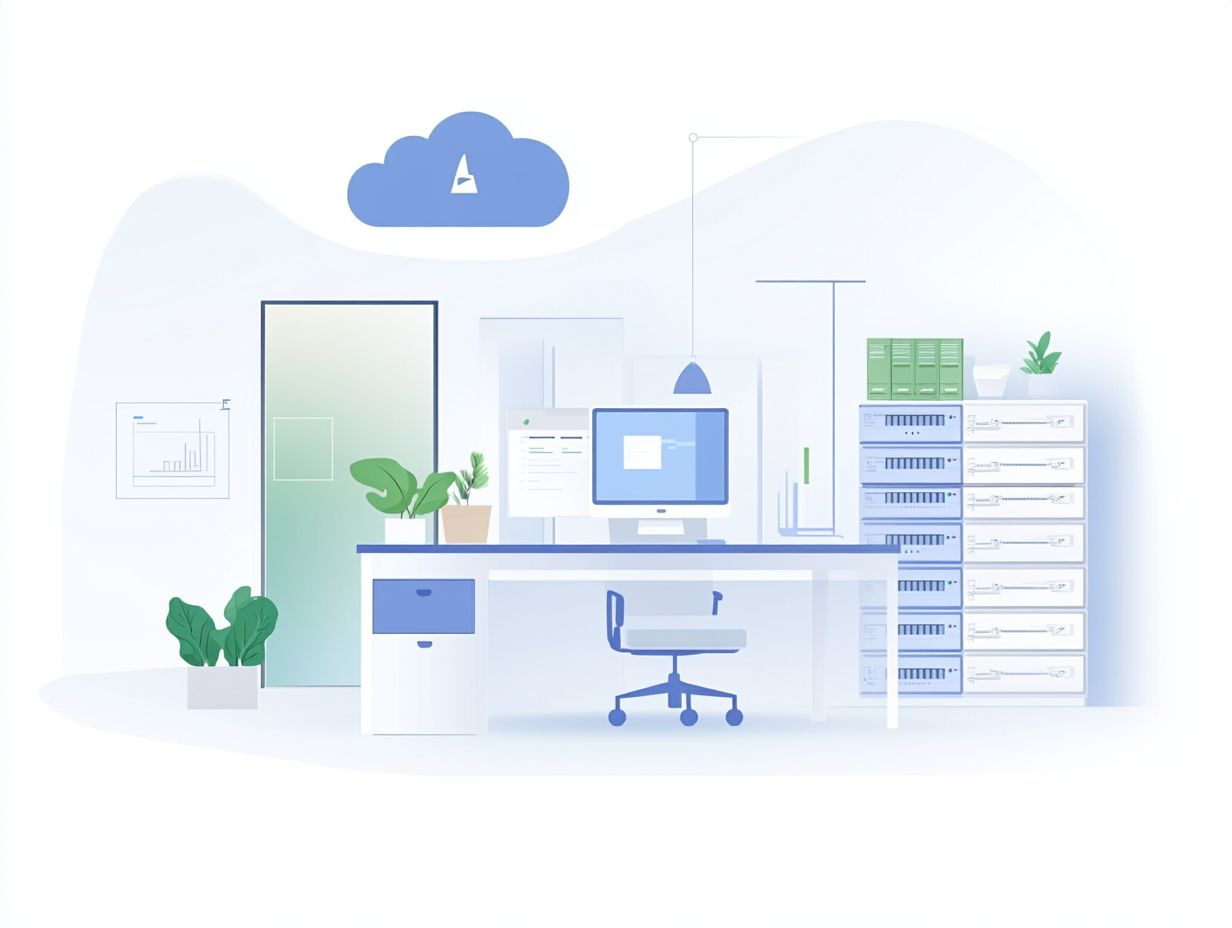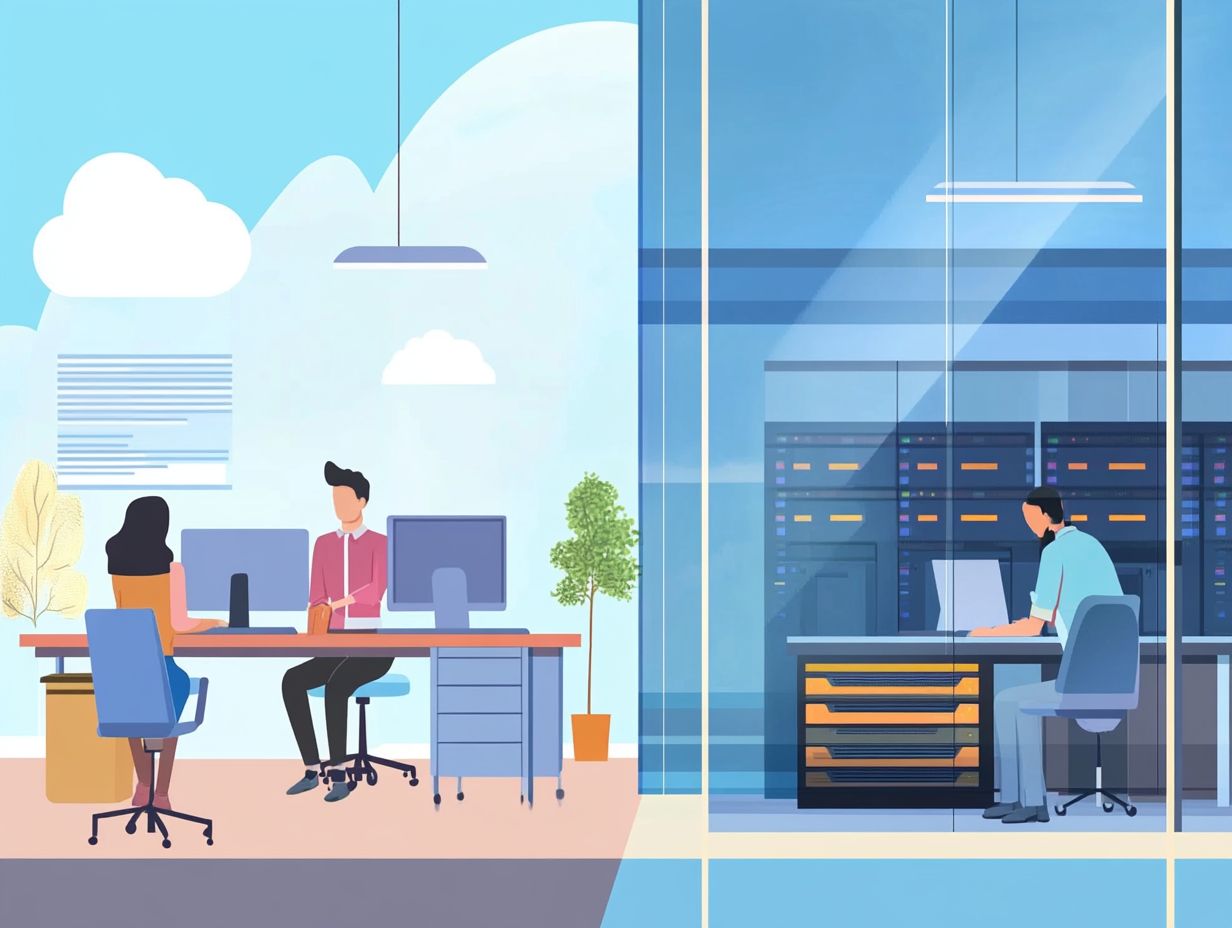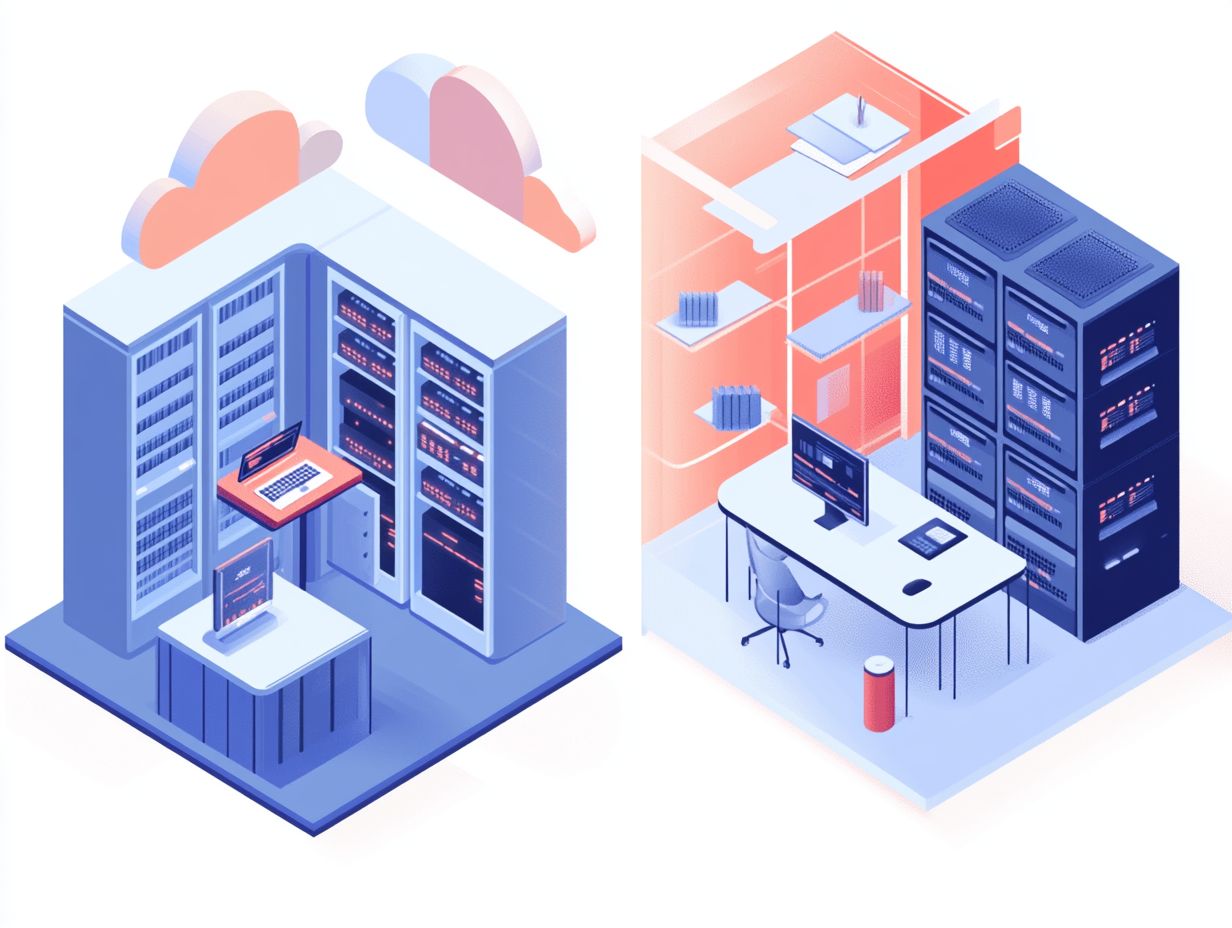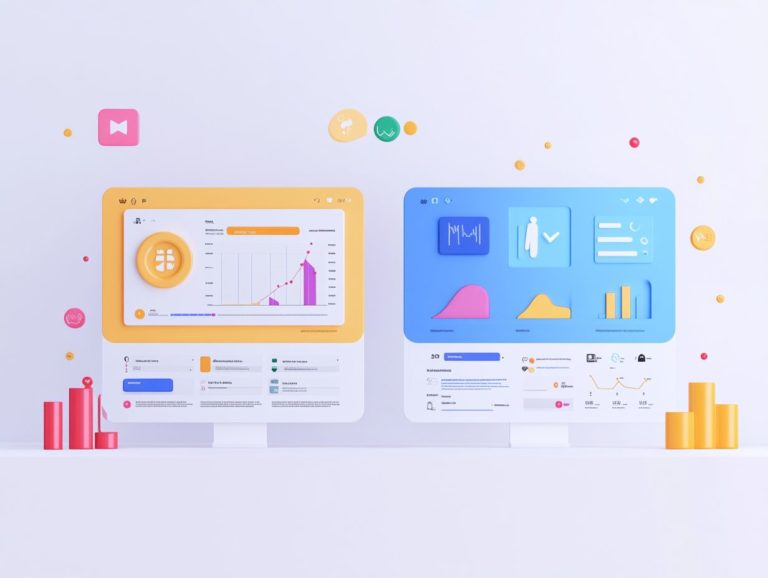Comparing Cloud-Based vs On-Premise CRMs
In today’s rapidly evolving business environment, mastering customer relationship management (CRM) is vital for achieving success. Let s dive into the basics of CRM systems, examining both cloud-based and on-premise solutions.
This guide highlights their unique features, benefits, and critical considerations, empowering you to determine which option best suits your business needs and budget.
By the end of this guide, you ll know how to choose the perfect CRM that supercharges your customer interactions and propels your growth forward.
Contents
- Key Takeaways:
- Understanding CRM Systems
- Cloud-Based CRM Solutions
- On-Premise CRM Solutions
- Comparing Cloud-Based vs On-Premise CRMs
- Factors to Consider When Choosing a CRM
- Frequently Asked Questions
- What is the difference between cloud-based and on-premise CRMs?
- What are the main advantages of using a cloud-based CRM?
- What are the benefits of using an on-premise CRM?
- How do the costs of cloud-based and on-premise CRMs compare?
- Can you switch from one type of CRM to the other?
- Are there any security concerns with using a cloud-based CRM?
Key Takeaways:

- Cloud-based CRMs offer flexibility, scalability, and cost-effectiveness.
- On-premise CRMs provide control and customization.
- Before choosing a CRM, consider your business needs, budget, and the features of each option.
- Both cloud-based and on-premise CRMs can effectively manage customer relationships if chosen wisely.
Understanding CRM Systems
Understanding CRM systems is crucial for any business aiming to enhance customer relationships and optimize operations.
Customer Relationship Management (CRM) systems serve as main tools, enabling organizations to efficiently manage interactions with both existing and potential customers. By integrating data from various channels, CRM solutions enhance communication, boost customer satisfaction, and increase sales.
Whether you choose cloud-based CRM solutions or prefer on-premise alternatives, these tools help you address your specific data security needs and customization requirements while tackling scalability challenges.
What is a CRM and How Does it Work?
A Customer Relationship Management (CRM) system is your go-to software tool for managing interactions with customers and streamlining business processes.
By centralizing customer information, you can build better relationships and respond effectively to client needs. The CRM captures data from various touchpoints emails, social media, or websites offering you a comprehensive view of customer behaviors and preferences.
With regular software updates, you ll benefit from the latest enhancements and security measures, ensuring your system remains up-to-date. Robust data integration capabilities facilitate seamless communication between different departments, keeping everyone informed and aligned.
Its user-friendly support ensures you won t need to be a tech expert to navigate the system, making it accessible for all team members.
Cloud-Based CRM Solutions
Cloud-based CRM solutions have transformed the way you manage customer relationships, providing unparalleled flexibility, scalability, and access to critical information from virtually anywhere with an internet connection.
Features and Benefits
The features and benefits of cloud CRM solutions greatly enhance your user experience while ensuring data privacy, making them an enticing choice for modern businesses like yours.
These solutions offer exceptional ease of use, streamlining your workflows and facilitating effective collaboration and communication within your teams.
With regular software updates, you can effortlessly access the latest features and improvements without the burden of managing installations. This continuous evolution not only boosts functionality but also addresses security vulnerabilities, allowing your organization to operate confidently.
Robust data security measures are built in, keeping your sensitive information protected against ever-evolving cyber threats.
By addressing these essential areas, cloud CRM solutions align perfectly with the dynamic landscape of business needs, equipping you with the tools necessary for growth and efficiency.
In conclusion, understanding and selecting the right CRM system is pivotal for fostering robust customer relationships and enhancing operational efficiency. Explore your CRM options today to find the one that fits your business best!
Considerations Before Choosing a Cloud-Based CRM

Before you select a cloud-based CRM, it’s essential to consider important factors, including the risks of vendor lock-in, your data security needs, and how much customization you require.
Evaluating compliance requirements is vital, especially if you operate in industries like healthcare or finance that are subject to strict regulations.
Understanding any potential limitations of your chosen solution whether related to integrations with existing systems or its ability to support future growth can significantly influence your operational efficiency.
For example, if you’re running a growing company, opting for a CRM that scales effortlessly will allow you to add new users and features as your needs evolve.
By prioritizing these considerations, you can choose a CRM that fulfills your immediate requirements while aligning with your long-term goals, setting you up for continued success.
On-Premise CRM Solutions
On-premise CRM solutions provide complete control over your customer data. This allows for a strong system necessary to meet stringent data security requirements.
While this level of control comes with high upfront investments, the long-term benefits can significantly enhance your business’s data management capabilities.
Features and Benefits
The features and benefits of on-premise CRM solutions focus on better customization and greater control over data privacy elements that are crucial for many industries.
With these solutions, you can tailor your systems to fit your unique business processes, ensuring that every component aligns seamlessly with your operational needs.
You will enjoy a high level of control over permissions and data management, which boosts security and helps you stay compliant with regulatory requirements.
This degree of personalization fosters a deeper understanding of customer preferences and enhances your engagement strategies.
By strengthening customer relationships, you can drive loyalty and satisfaction, ultimately resulting in increased sales and a solid competitive advantage.
Considerations Before Choosing an On-Premise CRM
When you re contemplating an on-premise CRM, it s crucial to weigh several factors: the hefty upfront costs, the need for a dedicated IT team, and the challenges of scalability.
These considerations go beyond just the initial investment in hardware and software; they also include ongoing expenses for updates, security measures, and employee training.
You need to navigate the complexities of data backup and disaster recovery planning, which are vital for preserving data integrity over time.
The requirement for continuous maintenance can stretch resources thin, especially for small to medium-sized enterprises.
As a decision-maker, you must quickly assess whether the long-term benefits of an on-premise solution truly outweigh these operational demands.
Comparing Cloud-Based vs On-Premise CRMs
When you compare cloud-based and on-premise CRMs, it’s crucial for your business to understand cloud vs. on-premise CRM and their unique advantages and limitations, especially in terms of integration features and managing customer relationships.
This understanding will enable you to make informed decisions that best suit your operational needs.
Take action now to see what fits best for your business!
Key Differences and Similarities

One key distinction between cloud and on-premise CRMs is their approach to data security and management.
Cloud CRMs use industry-standard security measures like encryption. This is beneficial for businesses lacking in-house IT resources.
You can access your data from anywhere, increasing flexibility, but this may expose you to external risks.
In contrast, on-premise CRMs give you full control over security protocols. This is vital for organizations dealing with sensitive data.
However, this control comes with more responsibility, including the need for dedicated IT staff.
The integration capabilities of each option also vary. Cloud CRMs often connect smoothly with other software, while on-premise solutions may need extensive customization. For a deeper understanding, check out this comparative review of SaaS vs traditional CRM.
Factors to Consider When Choosing a CRM
When selecting a CRM, evaluate your needs along with your budget. This ensures the solution aligns with your goals.
Business Needs and Budget
Understanding your business needs and budget is crucial. Tailoring CRM features to your specific requirements streamlines processes and enhances customer interactions.
For a small business focused on personalized service, prioritize features like automated outreach and customer segmentation. This helps every client feel valued.
For larger enterprises, robust analytics and reporting capabilities are essential. They allow you to track trends across various markets.
Sticking to your budget avoids overspending and helps you make strategic investments that enhance customer satisfaction. A well-aligned CRM cultivates deeper relationships with your clients.
Frequently Asked Questions
What is the difference between cloud-based and on-premise CRMs?
Cloud-based CRMs are hosted on remote servers and accessed online. On-premise CRMs are installed on local servers and managed internally.
What are the main advantages of using a cloud-based CRM?

Cloud-based CRMs offer flexibility, lower costs, and scalability. Users can access the system from anywhere with internet, while the provider handles updates and maintenance.
What are the benefits of using an on-premise CRM?
On-premise CRMs provide greater control and customization. They are often preferred by organizations with strict data security regulations.
How do the costs of cloud-based and on-premise CRMs compare?
On-premise CRMs generally have higher upfront costs for licenses and hardware. In contrast, cloud-based CRMs often use a subscription model with lower initial costs. However, long-term costs for on-premise CRMs may be lower without ongoing subscription fees.
Can you switch from one type of CRM to the other?
Yes, you can switch from a cloud-based to an on-premise CRM, or vice versa. However, this may require significant investment to migrate data and customize the new system.
Are there any security concerns with using a cloud-based CRM?
Cloud-based CRMs store data on remote servers. Reputable providers implement strong security measures to protect sensitive information. Researching and choosing a trusted provider is essential to minimize risks.






